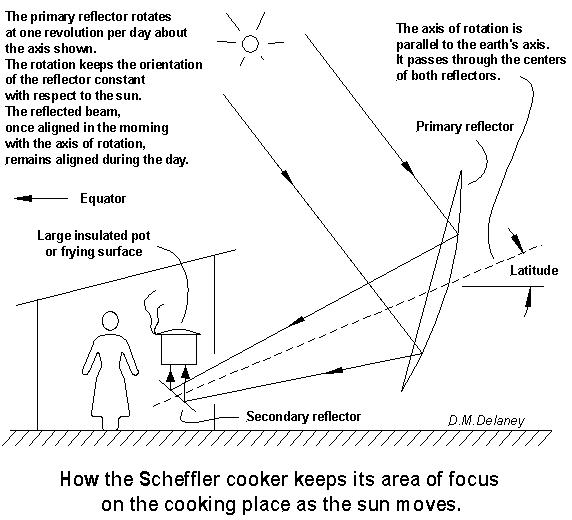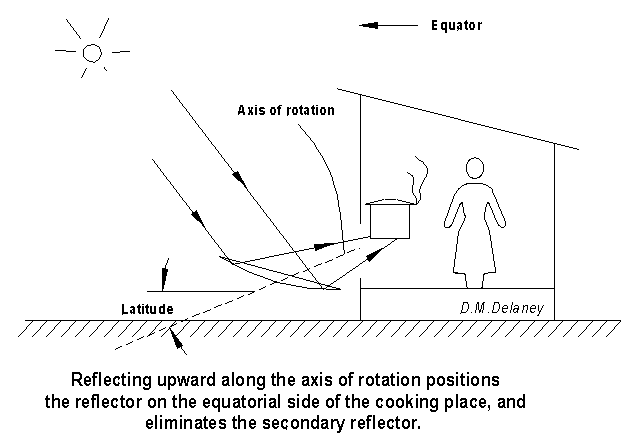
Wolfgang Sheffler and his colleagues have installed more than 200 community solar cookers since 1986, mostly in India.

A concentrating primary reflector tracks the movement of the sun, focusing sunlight on a motionless cooking place in a nearby shed. The focused light heats a very large pot, or a grill that fries flat breads.
The optical system of Scheffler's community solar cooker forms a heliostat. An article on heliostats in the eleventh edition (1910) of the Encyclopaedia Brittanica defines a heliostat as "an instrument which will reflect the rays of the sun in a fixed direction notwithstanding the motion of the sun. The optical apparatus generally consists of a mirror mounted on an axis parallel to the axis of the earth, and rotated with the same angular velocity as the sun."
The heliostat of Scheffler's cooker comprises a primary reflector, a secondary reflector, and a clockwork powered by gravity or photovoltaic panels. The primary reflector produces a converging beam of sunlight aligned with an axis of rotation which is parallel to the axis of the earth, and which passes through the centers of both reflectors. The clockwork rotates the primary reflector around its axis of rotation at a rate of one revolution per day, keeping the reflected beam aligned with the axis of rotation as the sun moves. The fixed secondary reflector reflects the beam from the primary reflector onto a cooking pot or frying surface.
Each morning, the operator rotates the primary reflector back to a starting position in which the secondary reflector is illuminated, and starts the clockwork. Every few days the operator adjusts the angle between the axis of rotation and the reflector to accommodate the seasonal variation in the height of the sun. Once the secondary reflector is illuminated and the clockwork is in motion, the spot of focused light remains on the secondary reflcctor all day.
The shape of the primary reflector approximates a paraboloid. The seasonal variation in the height of the sun requires changing not only the angle between the primary reflector and its axis of rotation, but also the shape of the reflector. The geometry of the framework supporting the reflecting surface is designed so that the action of changing the angle between the primary reflector and its axis of rotation produces forces which squeeze or stretch the primary reflector to produce the necessary changes of shape.
The primary reflector comprises a number of facets, usually flat glass mirrors. A concrete pad and a welded steel space frame provide support for the primary reflector. The area of the primary reflector in the configuration shown above is usually about 7 square meters, delivering approximately 2 kW to the cooking pot. In an alternative configuration, a smaller primary reflector is arranged to reflect upwards along the axis of rotation, eliminating the need for a secondary reflector.

Scheffler has deployed at least one heat storage system consisting of an iron mass in an insulated container. One end of the iron mass is exposed to the focus of the heliostat during the day, then capped with an insulated lid to save the collected heat for cooking or frying up to 24 hours later.
The Scheffler heliostat can be fabricated in a modestly equipped welding shop, with materials that are available in many developing countries. Fabrication, installation, and maintenance require substantial expertise. A very large Scheffler heliostat (50 square meters) has been deployed experimentally to power a crematorium in Valsad, Gujarat, India.
See also: